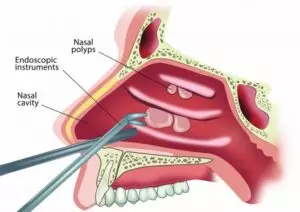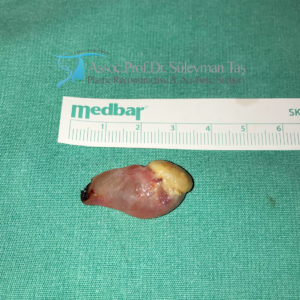What is Nasal Polyp?
Nasal polyps are non-malignant pieces formed as the pale pink colored small spots in the nasal and sinus cavities. Nasal Polyps are different formations rather than anatomically located conchae. Nasal polyps are seen in 1-4% of adults and 0.01% of children. The likelihood of nasal polyps increases after the age of 20. After telling What is Nasal Polyp?, We are going to tell symptoms and treatment of Nasal Polyp.
The appearance of nasal polyps resembles a mass filled with fluid. Obstruction in the nose triggers these formations. Since the causes such as allergy and aspirin sensitivity trigger intranasal obstruction, people who faced with these conditions are much more likely to have nasal polyps. 30% of Nasal polyp is seen in people who have allergies.
How are nasal polyps formed?
There are many factors that play a role in the formation of nasal polyps. These factors are;
- Allergies
- Asthma
- Genetic predisposition.
- Chronic sinusitis.
- Upper respiratory tract infection.
- Fungal sinusitis.
These factors cause edema in the nasal mucosa and fluid accumulates in it.
What are the symptoms of nasal polyp?
Nasal polyps are formations that do not show symptoms unless they block the sinus openings or are of large size. When it reaches large sizes and obstructs the sinus openings, it can lead to the formations such as infections and cysts. Symptoms of nasal polyp are:
- Runny nose (It can be transparent or colored).
- Reduction in the sense of smell and taste or disappearing over time.
- Headache.
- Pressure in the sinuses.
- Nasal congestion.
- Snoring.
- Sore throat.
- Dry mouth.
- Postnasal drip.
- Feeling that something is moving inside the nose.
- Enlargement in the bridge of the nose and accordingly eye structure changes as separated from each other.
Nasal polyp manifests itself with a runny nose, which usually does not pass with medications. In addition, if the polyp is located closer to the outer side, you may be able to see the polyp through the nostril.
How is Nasal Polyp Diagnosed?
You may have symptoms of nasal polyp. But your doctor should decide if the condition you’re facing is a nasal polyp. Your doctor can make this diagnosis by examining the nasal passages. During this examination a nasal endoscopy is performed with a device which has a camera attached to the tip.
In some cases, computed tomography (CT) is used to look at the nasal passages.
How is nasal polyp treatment done?
After the diagnosis of nasal polyp, it is time to have its treatment. Symptoms, allergy or infection status, findings and visualization in the nasal passages of the patient are the factors that determine the treatment process. There are two types of treatment for nasal polyp.
Medical Treatment:
Nasal polyps can usually be treated with the method of treatment called intranasal and systemic corticosteroid. In this way, problems such as runny nose and congestion can be solved. In cases such as allergies or flu, leukotriene antagonists and antihistamines are used as the additional medicines. Antibiotics are used in acute episodes of sinusitis additionally to the non-steroid anti-inflammatories and decongestants.
Surgical Treatment:
When the sinus openings are blocked, drainage disorder occurs in the sinuses. This deformation can cause infection and inflammation. In such a situation, surgical treatment can be applied. Also, some nasal polyps may not respond to medical treatment. In this case, again surgical treatment is applied.
Endoscopic method is used while performing surgical treatment. The procedure is performed according to whether there is a condition accompanying the nasal polyp. Only polypectomy, in which nasal polyps are removed, or extended sinus intervention, which can be performed depending on the situation, will be the solution to the problem.
FREQUENTLY ASKED QUESTIONS ABOUT NASAL POLYP
1.NASAL POLYP OCCURS LATER?
2. WILL NASAL POLYPS REFORM AFTER TREATMENT?
3. AT WHAT AGE DO NASAL POLYPS OCCUR?
4. IS THE NASAL POLYP NOTICEABLE?
5. HOW ARE POLYPS CLUSTERED? SMALL OR BIG?
6. HOW LONG DOES THE NASAL POLYP SURGERY LAST?
7. WHEN CAN I RECOVER AFTER NASAL POLYP SURGERY?
8. WHEN CAN I BREATHE EASILY AFTER NASAL POLYP SURGERY?
We have come to the end of our blog post about nasal polyp prepared by TAS Aesthetic Surgery Center. In this article we gave the answer to some of the major questions like, “What is nasal polyp?”, “How is nasal polyp formed?”, “What are the symptoms of nasal polyp? and “How to treat nasal polyp?”. If you want to get more information on the subject, you can contact us on +90 543 456 36 93. You can click on the link to get more information about rhinoplasty.




Will my nose change if I lose weight? When should I have rhinoplasty?
Hello Zilan, thank you for your question. Significant weight loss may have an impact on the skin, therefore recommended to have a rhinoplasty surgery after reaching the ideal weight.
What happens if a patient is due to have a rhino plasty and you notice he or she has a nasal polyps?? Do you proceed two diffrent surgeries ..?
Thanks very much for this article very well illustrated and a great input to our knowledge🙏🍀
Hello Karima thanks for your question. As every surgery rhinoplasty requires detailed surgical planning based on the endoscopic examination where all functional and aesthetical issues are determined including polyps if there are any. Polyps can be removed by the endoscopic surgery in the atraumatic manner without harming the surrounding tissues during the surgery.